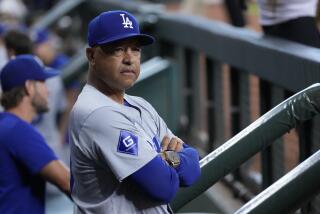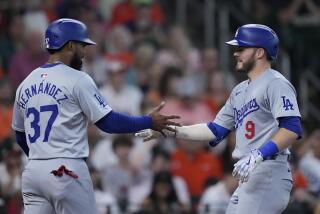TRADE WATCH
- Share via
As the clock ticks toward Saturday’s midnight deadline for the 30 major league teams to trade without waivers, baseball has turned into telephone heaven.
The lines are buzzing and rumors are rampant, but the only certainty, as Cleveland General Manager John Hart put it, is that “there is not that one, slam-dunk guy out there.”
He referred to a No. 1 or 2 caliber pitcher who could be counted on to take a contender to the playoffs.
Which is what Randy Johnson did for the Houston Astros last year after he was obtained from the Seattle Mariners on the night of the deadline.
“We didn’t win the World Series with Randy, but he helped us win the division [title] and he helped bring the city to life,” Houston General Manager Jerry Hunsicker said.
“There’s some good pitchers out there now, but I don’t see any primo guys of Randy’s caliber. It’s a seller’s market, and I’m not going to overpay for a guy who won’t have a significant impact.”
There aren’t many of Johnson’s capability anywhere, but several familiar names--high salaried and high risk--are likely to move before the deadline.
Two already have.
The San Francisco Giants obtained Livan Hernandez from the Florida Marlins, and the New York Mets got Kenny Rogers from the Oakland Athletics.
The price for Hernandez was two No. 1 draft choices, Jason Grilli and Nate Bump, both pitchers.
Some in baseball felt the Giants mortgaged their future.
Said Hunsicker, who dealt pitching prospects Freddy Garcia and John Halama, both in the Seattle rotation, and young infielder Carlos Guillen, who began this season as Seattle’s second baseman before suffering a season-ending knee injury, for Johnson:
“Arguably, the Giants gave up better talent for Livan Hernandez than we gave up to get Randy Johnson. That’s the kind of risks you’re going to have to take this year, with the market as thin as it is.
“I mean, a lot more mistakes are made trying to juice a trade at the deadline than at any other time. You can count on overpaying if you’re a buyer at the deadline.”
Consider Bill Bavasi, the Angels’ general manager.
His team is done, which makes him a seller and permits him to wear a mask. He has two available pitchers--Omar Olivares (8-9, 4.05 earned-run average) and Chuck Finley (5-9, 5.68)--and reportedly is trying to hold up interested teams, at least for now.
He is said to have asked the Cincinnati Reds for Brett Tomko and Danny Graves for Olivares, and he is seeking power-hitting Richie Sexson, infielder Enrique Wilson and a pitcher from Cleveland for Finley, who at a struggling 36 and eligible to re-sign with the Angels as a free agent at the end of the season isn’t the “slam-dunk guy” Hart covets. Still, Finley would provide veteran depth for the playoffs, particularly with his 16-9 mark against the New York Yankees.
The Indians, however, aren’t going to give up Sexson and Wilson to rent Finley, and the Yankees, who would like to keep him away from the Indians and are believed to be offering Andy Pettitte (7-7, 5.57), aren’t going to part with shortstop Alfonso Soriano, their top prospect.
The introduction of the wild card three years ago significantly changed the landscape as teams try to decide if they’re in or out of the race, if they should retain a key player or try to trade him.
“With the wild card, July 31 is really too early for a final determination on whether you’re in or out,” Philadelphia General Manager Ed Wade said.
“If you decide to keep a prospective free agent and then lose six in a row in August and drop out of the race, you’re stuck with a player who then has no trade value. It would be more sensible to have the deadline at the end of August, when playoff rosters have to be set.”
The young Phillies have developed into a legitimate contender, stripping the market of the coveted Curt Schilling, and the Toronto Blue Jays, the new wild-card leader in the American League, have taken David Wells and Kelvim Escobar off the market and are hesitant to trade Pat Hentgen as well.
“I will say, unequivocally, that Schilling will not be traded,” Wade said. “Our goal is to build around him. We’re hopeful of adding a veteran pitcher to the rotation before the deadline, but there’s a lot of competition. There are more clubs looking for pitching now than there were in March.”
Illustrative of the demand was that a Tuesday night matchup between Seattle’s Jeff Fassero, who was 4-11 with a 6.86 ERA and led the majors in home runs allowed, and Kansas City’s Kevin Appier, who was 8-9 with a 5.00 ERA and has yet to regain full velocity after shoulder surgery last winter, drew a scouts’ convention to the Royals’ park.
If pitching weren’t so thin, would a sane general manager trade for either of those available suspects?
Or for Darryl Kile, who is 5-10 with a 6.34 ERA and is owed $8 million next year? Kile, packaged with Darryl Hamilton and $1 million, was almost traded Monday by the Colorado Rockies to the Milwaukee Brewers for Marquis Grissom and Scott Karl before the Brewers backed out.
Steve Trachsel (3-14, 6.55), Darren Oliver (5-7, 4.72), Kent Mercker (4-4, 5.15), Juan Guzman (5-8, 4.21), Alex Fernandez (4-6, 3.01) and the dreaded Carlos Perez (2-10, 7.43) are also among available starting pitchers.
The Dodgers, of course, would love to unload Perez, but he has $12.6 million left on his three-year mistake, and money is also a significant obstacle in ongoing attempts to trade the benched Eric Young, the second baseman who is owed $9 million over the final two years of his contract.
There is widespread interest in Ismael Valdes, Chan Ho Park and Darren Dreifort, but it seems unlikely the Dodgers can find equitable value in a midseason trade.
There may be more possibility of a deal involving Eric Karros. That speculation refuses to die. Baseball sources say the Atlanta Braves (if they don’t trade for Will Clark, Mark Grace or Fred McGriff), Baltimore Orioles (if they trade Clark) and the Blue Jays are all interested in Karros, who needs only 29 more homers to become the Los Angeles Dodger leader in that category--should tradition still mean anything.
The surging Blue Jays would like to insure their playoff potential by adding power in the designated-hitter role, but Glenallen Hill of the Chicago Cubs or David Segui of the Mariners would be less expensive than Karros and either seems the more likely acquisition.
The Angels, between Finley and Olivares calls, are also shopping reliever Shigetoshi Hasegawa, with the Astros, Red Sox and Mets among interested teams.
The Mets, having added Rogers but faced with the loss of closer John Franco until September, are trying to fill that gap by improving their overall bullpen depth. Hasegawa is one option. Mike Trombley of the Minnesota Twins, Arthur Rhodes of the Orioles and Scott Radinsky of the St. Louis Cardinals are among others.
The Braves are also in the bullpen market and could have enough prospects to meet Montreal’s price for Ugueth Urbina.
The Cardinals are looking at Kile and Appier; the Indians, Red Sox and Texas Rangers at Guzman, and the Red Sox and Mets at Albert Belle, who is owed $52 million over the next four years in a complicated contract that makes a trade unlikely.
The Indians are also seeking a short-term replacement for injured third baseman Travis Fryman, with Ed Sprague of the Pittsburgh Pirates a possibility. The Rockies would trade third baseman Vinny Castilla, who intrigues the San Diego Padres, but would want a major pitching package in return, including a proven major league starter.
Few teams are in position to trade that kind of slam-dunk guy, and as Hart noted, the deadline market is devoid of one.
More to Read
Go beyond the scoreboard
Get the latest on L.A.'s teams in the daily Sports Report newsletter.
You may occasionally receive promotional content from the Los Angeles Times.










